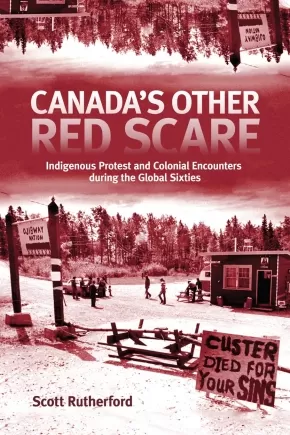Scott Rutherford
Scott Rutherford teaches in the Department of Global Development Studies and the Cultural Studies graduate program at Queen's University.
Books (1)
Synopsis:
A detailed transnational history of Indigenous activism in Northwestern Ontario and its global significance.
Indigenous activism put small-town northern Ontario on the map in the 1960s and early 1970s. Kenora, Ontario, was home to a four-hundred-person march, popularly called "Canada's First Civil Rights March," and a two-month-long armed occupation of a small lakefront park. Canada's Other Red Scare shows how important it is to link the local and the global to broaden narratives of resistance in the 1960s; it is a history not of isolated events closed off from the present but of decolonization as a continuing process. Scott Rutherford explores with rigour and sensitivity the Indigenous political protest and social struggle that took place in Northwestern Ontario and Treaty 3 territory from 1965 to 1974. Drawing on archival documents, media coverage, published interviews, memoirs, and social movement literature, as well as his own lived experience as a settler growing up in Kenora, he reconstructs a period of turbulent protest and the responses it provoked, from support to disbelief to outright hostility. Indigenous organizers advocated for a wide range of issues, from better employment opportunities to the recognition of nationhood, by using such tactics as marches, cultural production, community organizing, journalism, and armed occupation. They drew inspiration from global currents - from black American freedom movements to Third World decolonization - to challenge the inequalities and racial logics that shaped settler-colonialism and daily life in Kenora. Accessible and wide-reaching, Canada's Other Red Scare makes the case that Indigenous political protest during this period should be thought of as both local and transnational, an urgent exercise in confronting the experience of settler-colonialism in places and moments of protest, when its logic and acts of dispossession are held up like a mirror.
Reviews
"I was truly impressed with this book. Rutherford provides detailed insights into historical developments in the Kenora region and the post–World War II racism that is so fundamental in shaping current Indigenous realities. The almost seamless integration with global political commentary and international debates is simply superb. There are tough concepts presented here – and folks will find them uncomfortable – but a study like this is much overdue and will attract considerable international attention." - Ken Coates, Johnson-Shoyama Graduate School of Public Policy, University of Saskatchewan
Educator Information
Table of Contents
Acknowledgments / vii
Figures follow page viii
Introduction: The Town with a Bad Name / 3
1 Canada’s Alabama? Race, Racism, and the Indian Rights March in Kenora / 21
2 “Resolving Conflicts”: Culture, Development, and the Problem of Settlement / 40
3 “The quest for self-determination”: The Third World, Anti-colonialism, and “Red Power” / 62
4 “Nobody seems to listen”: The Violent Death Report and Resistance to Continuing Indifference / 83
5 The Anicinabe Park Occupation: Red Power and the Meaning of Violence in a Settler Society / 104
6 The Native People’s Caravan: Surveillance, Agents Provocateurs, and Multi-racial Coalitions / 124
Conclusion: Dear Louis Cameron / 145
Notes / 153
Bibliography / 187
Index / 203
Additional Information
208 pages | 5.98" x 9.01"






